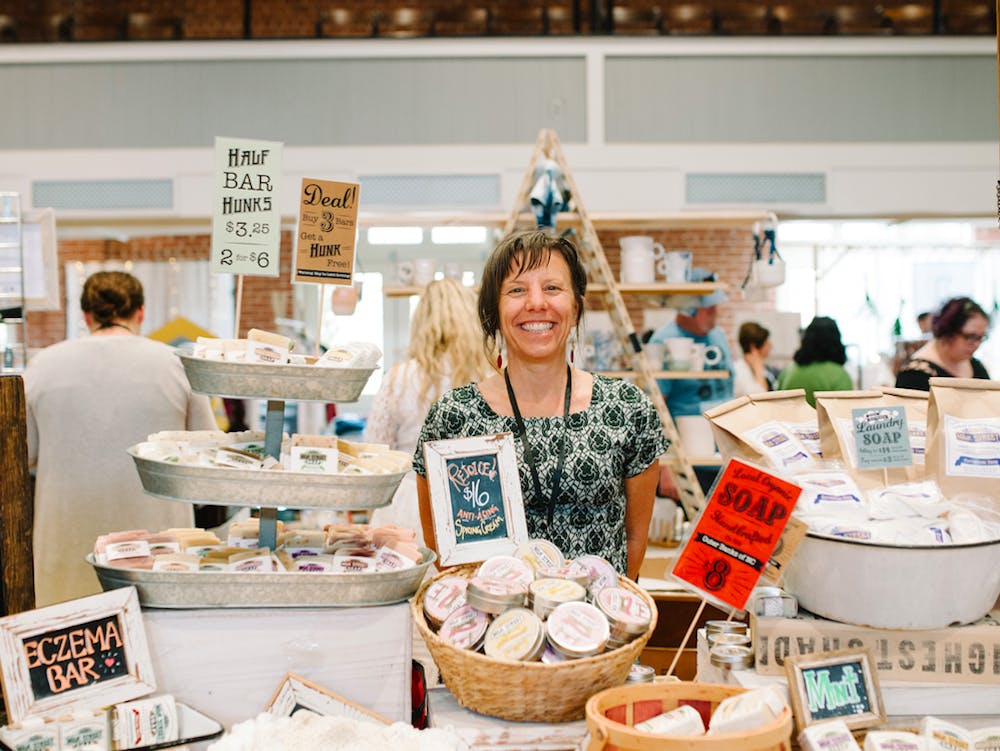The highest bidders in The Patchwork Market’s Instagram auctions win hand-crafted prizes, but founder Morgan Grimm’s hope is that the featured makers come out victorious, too.
In a different version of reality, more than 75 local makers are preparing to sell their handmade goods at Patchwork’s Spring Market, which would have been held April 27 at the Durham Armory. Due to the COVID-19 pandemic, the event has now become the Summer Market, which will be held Aug. 23. In the meantime, Grimm is facilitating a series of virtual auctions on the market’s Instagram page — dubbed Insta-Auctions — to support the makers, many of whom are dealing with significant virus-related business repercussions.
“Going online was definitely not something that I saw in our future, but I felt like we needed to adapt pretty quickly, just because a lot of makers have this as their sole source of income,” Grimm said. “They need to constantly be making money, and with all of the markets canceling, they’re not able to do that.”
The first two auctions took place on March 21 and April 5. In a 24-hour period, featured items were posted on Patchwork’s account and patrons posted their bids in the comments. The makers then contacted winners directly to arrange payment and delivery.
“[The first auction] went really well. I’d say 95% of all the items were sold,” Grimm said. “I like that it really creates accessibility for a lot of people — most people have phones and most people can get Instagram, so I think that that’s really cool that even if you can’t get out to the market in person, you can still support those makers.”
Grimm described the shift to online programming as simply a “continuation” of Patchwork’s overarching mission of helping the Durham handmade community by giving Triangle residents a consistent place to purchase their goods, a sentiment with which calligrapher and small-business owner Kathryn Carter agreed.
“In 2018, I went to my first Patchwork Market and it was fantastic. I admire how they foster a communal environment between customers and vendors [at] every pop-up market. Patchwork is all about bringing people together and when I saw the … Insta-Auction I thought to myself, ‘They’ve done it again,’” Carter wrote in an email. “Patchwork Market wants to see local businesses continue to thrive — even during uncertain times — and as a small business owner, I appreciate their ingenuity and efforts towards this.”
Carter, who balances running her design company Uncapped Calligraphy and Design with her fashion and textile management studies at N.C. State, said she’s feeling the consequences of COVID-19 in both her personal and professional life. On top of moving back to her parents’ home and dealing with online classes, her business has seen a decline in sales during the first quarter of the fiscal year, which Carter described as “notoriously slow” even in years not affected by a global pandemic.
“Despite the negative effects of the virus, I choose to not see this as lost sales, but as an opportunity to continue in my education of the industry, broaden my product line, and support others in all of my efforts,” Carter wrote. “In addition ... coronavirus has forced me to become more creative in my content, products, and marketing. In everything that I produce, whether as a product or social media post, I want to enable others to uncap their own creativity.”
Carter participated in both Insta-Auctions so far, selling custom hand-drawn house portraits adorned with calligraphy of the winners’ family names.
“I want to continue to work with and alongside like-minded organizations, local artists and consumers which is why I [chose to] participate in these Insta-Auctions,” Carter wrote. “As a vendor, I jumped at the opportunity to continue to connect with new clients, to get my brand name out there and, above all else, brighten someone’s day with my products.”
Both Grimm and Carter named purchasing goods from small businesses as the primary way for people to support them during this time, but engaging with them on social media and getting their brand names out to others can also make an impact.
“The bottom line is pay the makers. If they’re asking for $10 and you’re able to pay $15, do that,” Grimm said. “I think putting money into the situation is what’s going to help the most, and if you’re not able to, share their posts, comment on their posts, like their posts, tag people in their posts — even if you can’t financially support them ... get them out to people who might not even know they exist.”
Grimm hopes that the pandemic lockdowns lift in time for Patchwork’s Summer Market to go on as planned, but for now, she foresees continuing virtual programming as necessary to support the community.
“I love how there’s so many markets [in the area], and I think we need to continue that and see some other people start online sales or markets for the makers,” Grimm said. “I would honestly encourage more markets to do some type of online sales or online auctions, because we really are facilitators for our makers, and we need to bridge that gap right now.”
Get The Chronicle straight to your inbox
Sign up for our weekly newsletter. Cancel at any time.

